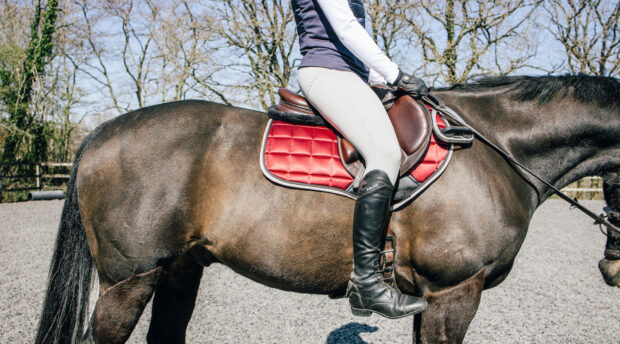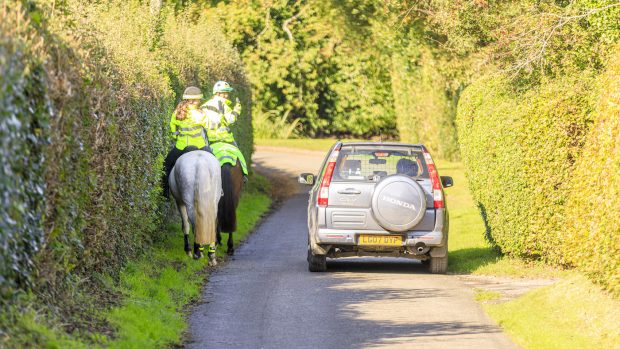The hunting ban, lamentable though it is, has had the unexpected benefit of attracting a swell of support from people who might not have hunted before, but were stung by the legislation into giving it a try. Last season, many hunts saw new faces at their opening meets, and this season there will be more.
If you have no experience of hunting, you are likely to have the (largely correct) impression that it involves a series of rituals and conventions, the details of which you should master if you are to get the best out of the experience.
Now that newcomers’ days are an established tradition, hunts really ought to hold newcomers’ pub evenings, at which the basics of hunting could be explained over a pint and a packet of crisps. But in the absence of this friendly gesture, let us see what we can do.
Hunting etiquette can be considered under three main headings: safety, good manners and turnout. Of these, the first two are more important, but the third is the one that everyone worries about, so here goes.
Turnout
As a novice, you can forget about red coats, gold foxhead pins, silk hats or any of the other fabulous peacockeries to be glimpsed in the more theatrical Shire counties. You are aiming to look tidy and inconspicuous. A tweed jacket, fawn breeches, a white shirt with a tie, black boots and a velvet cap or jockey skull with a dark silk will do it.
Do not be tempted into unwise expressions of individuality. Lipstick is fine (for girls); dangly earrings (for either sex) are not. One mild-mannered hunt secretary of my acquaintance has a particular aversion to the sight of people sporting amusing bobbles on their silks, and has been known to turn savage and send them home.
As a newcomer, you probably won’t be reproached if you turn up — as someone did to one of our Boxing Day meets — in a black satin bomber jacket with a pink fleece underneath, but people will notice, and think loud thoughts.
Your horse and tack should be clean and, unless you have specifically been told otherwise, you should plait the horse’s mane.
The business of getting all dressed up in order to get covered in mud the instant you leave the meet may seem wildly eccentric, but, by looking smart, you are honouring the generosity of the people who have invited you to ride over their land, and the skill and hard work of the hunt staff.
Safety
Now that you are looking respectable, let us think about safety. The more flustered you are, the more likely you are to have a silly accident. Hunting directions often have a curious, impressionistic quality and it is upsetting to find yourself desperately seeking an elusive meet, so allow masses of time.
Before you set off, check your equipment. You do not want to discover, halfway to the meet, that you have forgotten your hat. I did this once. The person driving the lorry happened to be the MFH. I never forgot my hat again.
If your horse is new to hunting, you should tie a green ribbon in its tail. If it might kick, tie a red ribbon. In any event, keep your distance from other horses and from hounds. Hunts have long memories and 20 years hence you will have grown very weary of hearing the story about how your mare kicked a hound your first time out.
Always do what the field master says. “Hold Hard!” means “Stop now. And don’t move until I tell you.”
Good manners
Mention of masters brings us to the subject of manners. Perhaps you have encountered the master socially. Do not, however, hail him on a hunting morning with a cry of “Hi, Timmy darling!” or “Yo, Otis, my man!” He will not be amused.
What you say is “Good morning, master”. Without giggling. In fact, “good morning” is what you say to everybody.
Nowhere in Britain, except on the hunting field, is it acceptable to speak to people you don’t know. So make the best of the unaccustomed freedom, and if you see someone you like the look of, zoom over and say “good morning”.
Whether you like the look of them or not, you must say “good morning” to the masters, the huntsman and the hunt secretary, to whom you must hand, unprompted, your cap. She is the one with the haunted expression who clanks when she moves, because everyone has given her their riding money in loose change.
Don’t, in this flurry of good mornings, forget to include people on the ground. That unsavoury figure in the corduroys held up with baler twine is the owner of most of the land over which you are about to ride. And the white-haired old biddy in a pinny is his mother. Snub them at your peril.
At the covertside, it is safest to behave as though at a quite formal drinks party. Chat politely, but don’t shriek; turn off your mobile, don’t get drunk — tragically easy, with everyone offering you sips from their flasks — and if you break anything (jumps, gates) offer to make good the damage. Make way for masters, hunt staff and passing cars, remembering to smile, not scowl, at the latter.
Be kind to the old, the young — even the loathsome child who cuts you up at a jump — and the fallen. One of these days, it may be you lying winded on the ground and you’ll be glad of the sympathy.
We have arrived at the subject of pilots, and here, perhaps, it is hunts, rather than newcomers, who should worry about their manners. All hunts claim to embrace newcomers with enthusiasm, and so they do at the meet. But when the hunt moves off the enthusiasm becomes vaguer; it is a bore to be lumbered with someone inexperienced and easy to assume that someone else is looking after them.
Some hunts operate an official system of hunting nannies, which is an admirable idea, for it stops the newcomer feeling anxious or guilty about spoiling someone’s day by tagging along behind them and benefits the hunt as well. After all, a happy newcomer who has had a thrilling day is next season’s subscriber.
That’s it. You have negotiated your first day’s hunting, made friends, watched hounds work, had an amazing adventure — and now it is time to go home.
Don’t just slip away, though. For a start, you don’t want people to think you’re lost. But more importantly, you are part of something now; you have joined the hunting community.
So say goodnight (even if it is still light) and thank the masters, huntsman and (an important piece of new hunting etiquette) the functionary known in my hunt as “the drag queen” — the saintly, malodorous figure who has spent his day being pursued by a pack of hounds and a troupe of excited horses.
And on the long, cold hack to the boxes, you can warm yourself with this thought: next time you come out, you won’t be a newcomer any more.
Jane Shilling is the author of a hunting memoir, The Fox in the Cupboard (Penguin, £7.99)
This feature was first published in Horse & Hound’s hunting special issue (26 October ’06), which also includes features on great hunt horses, new faces, cut backs in hound breeding and the annual hunt directory




